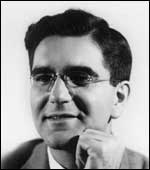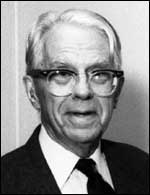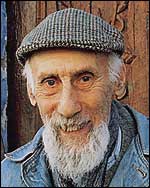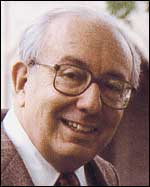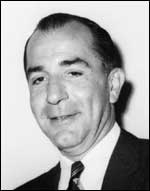|
|
|
OBITUARIES
 |
|
1929
|
 |
Joseph Joffe,
retired professor, Maplewood, N.J., on August 7, 2000. Born in
Russia in 1909, Joffe immigrated with his family to the United
States after the Russian Revolution, attended high school in the
Bronx and won a Pulitzer scholarship to the College. He earned a
B.S. from the Engineering School (1930) and an M.S. in physics
(1931) and a Ph.D. in chemistry (1933) from GSAS. His thesis
advisor was Dr. Harold Urey, and as a University Fellow in
Chemistry, Joffe assisted Urey in his Columbia laboratory in the
discovery of heavy hydrogen that eventually earned Urey the Nobel
Prize. During World War II, Joffe was part of the Manhattan
Project, working on the separation of fissionable U235 from the
inert U238. Joffe taught chemical engineering at the New Jersey
Institute of Technology (formerly the Newark College of
Engineering) for 43 years, serving as chairman of the departments
of chemical engineering and chemistry. Although he taught almost
every course in chemical engineering and many chemistry courses,
his primary area of expertise was thermodynamics. Widely recognized
as one of America's leading thermodynamicists, he advised numerous
master's and doctoral students in the area, and in the 1960s he
developed the Joffe Equation of State. He also served as a
consultant to many corporations, including 29 consecutive summers
at Exxon Research and Engineering in New Jersey. Joffe, who retired
from teaching in 1975, was a fellow of the American Institute of
Chemical Engineers and a member of numerous professional societies.
Survivors include a son, Richard Joffe '72.
 |
|
1932
|
 |
Charles E.
Schmonsees, retired educator, Clearwater, Fla., on May 12,
2000. Schmonsees had been a teacher for many years at the Franklin
School in Summit, N.J.
 |
|
1933
|
 |
Alois Niles
Schoening, retired production manager, Louisville, Ky., on May
8, 2000. A native of the Bronx, Schoening was a star on the
College's track team and won the Metropolitan 60-yard sprint title
his sophomore year. Except for service in the U.S. Army during
World War II, Schoening worked for Colgate-Palmolive for his entire
professional career, retiring as production manager for the
company's plant in Clarksville, Ind. He retired to Louisville,
where he was an active member of the Christ Church (United
Methodist) and the local YMCA.
 |
|
1934
|
 |
Fon Wyman Boardman,
Jr., author and publisher, New York, on August 3, 2000. A
member of Phi Beta Kappa, Boardman worked at Columbia University
Press from his graduation until 1951, when he moved to Oxford
University Press. He also served as a lecturer in English at the
School of General Studies in the early 1950s. Although Boardman
worked in the publicity departments at both presses, he found time
to write on a wide variety of topics. Among his many titles were
Castles (1957), Roads (1958), Canals (1959),
History and Historians (1965), Economics: Ideas and
Men (1966), America and the Gilded Age, 1876-1900
(1972), America and the Virginia Dynasty, 1800-1825 (1974),
Around the World in 1776 (1975), and America and The
Jacksonian Era, 1825-1850 (1975). Even after his "official"
retirement, Boardman was a contributing editor to The
Encyclopedia of American Facts and Dates (1987). Boardman also
put his literary skills to the service of his alma mater. During
World War II, he penned Columbia: An American University in
Peace and War (1944), a short history of the University written
for naval personnel who were training on campus, and he edited
Columbia University in Pictures (1954) for the University
bicentennial. (Columbia University Press published both volumes.)
The Class of 1934 had no more loyal alumnus than Boardman, who
always proudly identified himself as a member of "the Rose Bowl
Class of 1934." Until slowed down by illness, he was a fixture at
campus events, alumni gatherings and Columbia Club events. He
served on the King's Crown Advisory committee, the Columbia
University Forum advisory board and the board of governors of the
Columbia University Club. In May 1989, the Columbia College Alumni
Association presented Boardman with the President's Cup for
"outstanding service to the College and to his Class." He is also
fondly remembered for his service as class correspondent for
Columbia College Today in the early 1980s and again in the
late 1990s.
 |
|
1936
|
 |
Louis Allocca,
retired lawyer, Vero Beach, Fla., on April 3, 2000. Allocca, who
took courses at the Law School, received an LL.B. from NYU in 1940.
He worked as a tax attorney, senior tax and financial analyst, and
consultant for Union Carbide in New York beginning in 1952. He had
been a director of the Windsor Life Insurance Co. in New York and a
director of the YMCA in Ridgewood, N.J. His service to his alma
mater included a long tenure as vice president of the Columbia
Alumni Club of Bergen County, N.J. Allocca retired to Florida in
the 1980s.
 |
|
1937
|
 |
Alexander W.
Magocsi, physician, York, Maine, on March 8, 2000. A family
physician for more than 50 years, Magocsi became a pillar of the
community in his adopted home of York, Maine. He was born in New
York and attended P.S. 122 and Bryant High School before entering
the College. He earned his medical degree from the Long Island
College of Medicine and served his medical residency at the Long
Island College Hospital where he became a fellow in anesthesiology.
During World War II, Magocsi served in the U.S. Army's 63rd Tank
Destroyer Battalion and the Second Ranger Battalion. After the war,
he settled in York, where he was for a time one of only two local
physicians. He was instrumental in the development of the local
hospital, with which he was closely identified. A member of the
York County Medical Society, he served for a time as medical
examiner for the State of Maine. He was a founder and board member
of the York Volunteer Ambulance Association, a member of the York
School Board, and served as school physician. Other community
service included participation in Rotary International, the York
Club, the Save Our Children Foundation and Habitat for Humanity,
and a charter membership in the American Museum for Indians.
Magocsi even contributed a regular column, "A Biased View," to the
York Weekly, the local newspaper.
 |
|
1938
|
 |
James Ivers, Jr.,
retired engineer, Park City, Utah, on May 14, 2000. Ivers, who also
had a degree from the Engineering School, worked for many years as
a consulting engineer in the Salt Lake City area.
Robert Lax, poet,
Olean, N.Y., on September 26, 2000. Lax, who was the subject of a
feature story by James Uebbing '82 in Columbia College Today
(Fall 1999), was born to a prominent Jewish family which had helped
build a synagogue in Olean. He grew up in Olean and on Long Island,
and studied literature at the College, where he edited
Jester and became a close friend of some of Columbia's most
important literary figures, especially his teacher, Mark Van Doren,
and his classmate, Thomas Merton '38. One of his early poems, "The
Last Days of a City," won Lax the Boar's Head Prize from the
College and the Van Rensselaer Prize from the University for the
"best example of English lyric verse." In his celebrated
autobiography, The Seven Storey Mountain (1948), Merton
described Lax as "a kind of combination of Hamlet and Elias." He
was, Merton continued, "a potential prophet, but without rage,"
possessing a "mind full of tremendous and subtle intuitions." In
1943, Lax converted to Roman Catholicism, as his friend Merton had
two years earlier. Lax held various positions with a series of New
York magazines - editor at The New Yorker, film critic for
Time and publisher and editor of Pax - in the years
following graduation. He also spent long periods abroad, mainly in
Paris (where he worked at NewStory magazine), Marseille, and
Canada, where Lax (a juggler) toured with the Christiani Family
Circus. In the late 1950s, he became a "roving editor" for the
Catholic magazine Jubilee, which had been founded by Edward
Rice '40. In 1964, Lax abandoned magazine work altogether and moved
to the Greek island of Kalymnos (off the Turkish coast), eventually
settling on the Aegean island of Patmos. Although he never embraced
a religious vocation like his friend Merton, Lax's poetry often had
a subtle spiritual dimension, as in a highly praised early volume
of poems, The Circus of the Sun (1959), which he began with
a play on the opening verses of John's Gospel. His poetry never
became widely known in America, but it did win a small, devoted
following. Jack Kerouac '44 described Lax as "a Pilgrim in search
of beautiful Innocence, writing lovingly, finding it, simply, in
his own way." Lax received a National Council of the Arts Award in
1969. In a 1978 New York Times Book Review, Richard
Kostelanetz praised Lax as "among America's greatest experimental
poets, a true minimalist who can weave awesome poems from
remarkably few words." Lax continued to perfect the spare style
that became his trademark, occasionally generating poems consisting
of single words running down a page. Among Lax's recent books were
Love Had A Compass (1996), a collection of journal entries
and poetry, and A Thing That Is (1997). A final collection
of poems, Circus Days and Nights, was published in July
2000. Lax, who had moved back to Olean from Patmos in August
because of failing health, was buried in the Franciscan cemetery at
St. Bonaventure University. The university houses the Lax archives.
A memorial service for Lax was held at Corpus Christi Church on
West 121st Street in Manhattan on November 18.
William Jeremiah
Sheehan, retired naval officer, Williamsburg, Va., on January
19, 2000. A native of Catskill, N.Y., Bill Sheehan took courses at
the Graduate School of Business and eventually earned an M.B.A.
from Stanford. (He also earned a diploma from the Industrial
College of the Armed Forces in 1964.) After a brief stint at
Sinclair Refining in New York, Sheehan joined the U.S. Navy in
1942. Commissioned as an ensign, he served in the Navy Supply Corps
for 32 years, advancing through grades to captain. In the
mid-1960s, he worked in the Office of the Chief of Naval
Operations. Sheehan moved to Williamsburg after his retirement in
1975. He had been a member of the U.S. Naval Institute and Alpha
Sigma Phi. An avid birder and amateur ornithologist from his youth,
Sheehan was a charter member of the Williamsburg Bird Club, as well
as the club's first secretary and editor of the club's annual
annotated list of local birds.
 |
|
1940
|
 |
Abraham Seldner,
retired chemist, Princeton, N.J., on April 19, 2000. A Phi Beta
Kappa graduate of the College, Seldner spent his entire
professional life as a research chemist. After graduation, he
worked for F. Ritter & Co. in Los Angeles before returning to
the New York area to work for International Flavors and Fragrances,
Inc. and Rhodia Corp. Selder later worked for Dow Chemical, and
became manager of personal products for Johnson and Johnson, and
vice president for technical services for the Amerchol Corp. A
member of the American Chemical Society and the Cosmetic Chemists
Association, Seldner worked for a time after his retirement in 1982
as a volunteer consultant to Universe Beauty Company of Bangkok and
Azbane, a Casablanca-based cosmetics firm. Seldner, who was a
native of Union City, N.J., had lived in Princeton for the last 37
years. Survivors include his son, Joseph Seldner '73.
 |
|
1941
|
 |
John David Rainer,
psychiatrist, Eastchester, N.Y., on March 12, 2000. Born in
Brooklyn, Rainer was a Phi Beta Kappa graduate of the College in
philosophy and mathematics, earning a master's from Teachers
College in 1944 and his medical degree from P&S in 1951. He was
an internationally known researcher and educator in the field of
psychogenetics and the theory and practice of psychiatry for the
mentally ill deaf. A pioneer in the research of genetic factors in
schizophrenia and manic-depression, for over 45 years he was a
central figure at the New York State Psychiatric Institute, where
he held the positions of chief of psychiatric research, director of
the department of medical genetics and co-director of the
department's institutional review board. He is credited with
helping enhance the Institute's reputation as one of the preeminent
psychiatric research organizations in the U.S. Rainer was a
professor of clinical psychiatry at P&S, as well as a training
and supervising psychoanalyst at the Columbia University Center for
Psychoanalytic Research and Training. The author or co-author of
more than 150 scholarly articles, reviews and books, he was a life
fellow of both the American Psychiatric Association and the
American Psychoanalytic Association, and a former president of the
Westchester Psychoanalytic Society. Among his many honors, Rainer
could count the Pioneering Award from Gallaudet University, which
cited his "groundbreaking work in the advancement of mental health
practice in the deaf community, which has paved the way for all who
came after." A memorial ceremony for Rainer was held at the Hudson
River Museum on April 16, 2000. Survivors include a son, Jeffrey
Rainer '69.
 |
|
1942
|
 |
Lawrence S. Bangser,
attorney, New York, on May 20, 2000. The son of Adolph Bangser
(Class of 1907), Larry Bangser served in the Marine Corps during
World War II and earned his law degree at Columbia in 1937. He
first practiced law in New York at Kupfer, Silbereld, Nathan &
Danzinger, but later became a senior partner at the Manhattan firm
of Bangser, Klein, Rocca and Blum. A supporter of many charitable
causes, Bangser was a longtime coach for the Special Olympics. His
many services to his alma mater included membership in the John Jay
Associates program. Memorial contributions may be sent to the
Manhattan Special Olympics, c/o Jean Pine, 7410 35th Street,
Jackson Heights, N.Y. 11372.
 |
|
1944
|
 |
Clark Danielson,
retired, Santa Barbara, Calif., on August 19, 1999.
 |
|
1950
|
 |
Leo P. Mabel,
retired publishing executive, Seattle, on July 3, 2000. At the
College, Mabel was a starting tennis player and editor of
Spectator. A long-time publishing executive, Mabel's career
including stints as vice president of Henry M. Snyder, Macmillan
and Crowell Collier Macmillan in New York, as well as president of
Collier Macmillan International. He is credited with publishing
English translations of The Diary of Anne Frank and The
Great Soviet Encyclopedia as well as the English as a second
language series, ESL 900, and English This Way. A
world traveler known for his love of progressive politics, folk
music and tennis, Mabel had lived in New York City, Freeport, N.Y.,
London and Seattle, where he was a board member of the Forty Fifth
Street Community Clinic. Memorial donations may be made to the
Forty Fifth Street Community Clinic, 1629 45th Street, Seattle,
Wash. 98103.
 |
|
1951
|
 |
Eugene H. Courtiss,
surgeon and professor, Brookline, Mass., on July 11, 2000. A native
of Boston, Courtiss received his medical degree from Boston
University in 1955. He completed his residency at the University of
Minnesota and the former Peter Bent Brigham Hospital in
Massachusetts, and served as a captain in the Army Medical Corps.
From 1969-83, Courtiss was chief of the division of plastic surgery
at Newton-Wellesley Hospital. From 1987 until his death, he was a
consultant in surgery at Massachusetts General Hospital. A visiting
professor at 30 universities who taught 79 courses in plastic
surgery, he became an associate clinical professor of surgery at
Harvard Medical School in 1990. Courtiss, who served as associate
editor and book review editor of the journal Plastic and
Reconstructive Surgery, was the editor of five books on plastic
surgery. He had been a director, examiner, senior examiner and
chairman of the American Board of Plastic Surgery, as well as
president of the American Society for Aesthetic Plastic Surgery,
the Northeastern Society of Plastic Surgeons, the New England
Society of Plastic and Reconstructive Surgeons, and the
Massachusetts Society of Plastic Surgeons. Courtiss received the
Ivy Award for Best Paper from the American Society of Plastic and
Reconstructive Surgeons (1976), the Best Paper Award (1982) and
Distinguished Service Award (1989) from the American Society for
Aesthetic Plastic Surgeons, and the Distinguished Service Award
from the Plastic Surgery Educational Foundation.
Lawrence E.
Phillips, securities analyst, Ridgewood, N.J., on August 31,
2000. Phillips, who also earned a bachelor's degree from the
Engineering School and an MBA from Harvard, served in the U.S. Navy
in the Pacific Theater during World War II. He became a highly
respected electronics industry securities analyst, working at
Lehman Management Co., Kuhn Loeb, Kidder Peabody and other firms.
Memorial contributions may be sent to the American Diabetes
Association, 200 White Plains Road, Tarrytown, N.Y.
10591.
 |
|
1953
|
 |
Joshua Darsa,
television executive, Rockville, Md., on July 14, 2000. A native
New Yorker, Darsa took graduate courses in European diplomatic
history at Columbia and served in the U.S. Army, for which he wrote
a history of the atomic age. During the 1950s, he worked as a radio
reporter and television news anchorman in California and as an
editor for Reuters in London. From 1960-70 he worked for CBS News,
filing reports from Los Angeles, Chicago, New York and London. He
joined National Public Radio in 1971 as a reporter, later becoming
a senior producer and writer of documentaries, executive producer
of live events, and director of news and information development,
including coverage of the 1972 and 1976 presidential primaries and
party conventions. In 1984, he joined the Washington, D.C.-based
Corporation for Public Broadcasting as a senior program officer. In
this capacity, he helped develop The McNeil-Lehrer News
Hour, the documentary series Frontline, and Eyes on
the Prize, an award-winning, 13-part documentary on the civil
rights movement. Darsa won a number of Ohio State Awards for
coverage of the Watergate hearings and the Olympics as well as a
1978 Peabody Award for a documentary, Dialogues on a Tightrope:
An Italian Mosaic. Darsa had retired in September
1999.
 |
|
1954
|
 |
Henry Littlefield,
educator, Pacific Grove, Calif., on March 31, 2000. A native New
Yorker, Littlefield served as an officer in the Marine Corps from
1954 to 1958, stationed in Japan, where he earned a black belt in
judo and played on the 3rd Marines' championship football team. He
returned to Columbia, where he earned a master's and later a
doctorate in history. He began his teaching career at Mt. Vernon
High School in New York, where he taught history and coached
football and wrestling. Littlefield, who won club, Metropolitan,
Eastern and National titles as a wrestler for the New York Athletic
Club, led his Mt. Vernon wrestling team to the state championship
in 1967. Littlefield became dean of students and coach of football
and wrestling at Amherst College in 1968, leaving that position in
1976 to become headmaster of the York School in Monterey, Calif. He
served as headmaster at York for 14 years, also teaching American
history. He also taught at Golden Gate University and the Naval
Postgraduate School in Monterey; for the past six years, he was a
teacher at Robert Louis Stevenson School in Pebble Beach, Calif.
Littlefield published articles on a variety of topics, notably
American history and culture, and was a well-known speaker on the
Monterey Peninsula. His best-known lecture, "The Wizard of
Oz: A Parable on Populism," was reprinted in several
anthologies. At the College, Littlefield was a member of the
Columbia College Masquers and played the lead in the 1954
bicentennial Varsity Show. He later attended the American Theater
Wing in New York. On the Monterey Peninsula, he became well known
as a local actor, playing the lead in Macbeth, Eddie Carbone
in Arthur Miller's View from the Bridge and Daddy Warbucks
in Annie, among many other roles. A past president of the Monterey
Peninsula Rotary Club and the Monterey Peninsula Chamber of
Commerce, Littlefield served on the boards of All Saints Episcopal
School, the Monterey Peninsula YMCA, the Monterey County Library
and the California Association of Independent Schools. He was a
member of the Old Capital Club in Monterey, All Saints Episcopal
Church in Carmel and Church in the Forest in Pebble Beach, where he
also taught a Bible class.
John Marshall
Rubien, New York, on July 18, 2000.
 |
|
1956
|
 |
Enrique R. Larde,
Santurce, Puerto Rico, on June 3, 1999.
 |
|
1957
|
 |
Louis Barry Russell,
attorney, South Dartmouth, Mass., on November 10, 1999. A native of
New Bedford, Mass., Russell returned to his hometown after earning
his law degree from NYU. He became a founding partner (with his
father, Abram Rusitzky) and principal of the law firm of Rusitzky
& Russell in New Bedford, where he practiced for more than 40
years. A member of the bar associations of Massachusetts, Bristol
County, Boston and New Bedford, he was also an incorporator for
Compass Bank. Russell was a highly respected figure in the civic
affairs of southeastern Massachusetts. He was a founding member of
the Greater New Bedford Big Brother-Big Sister Program and Greater
New Bedford Legal Aid Services, and a past president and member of
the Greater New Bedford Jewish Federation and the New Bedford
Jewish Convalescent Home. Russell was both a member and director of
the Wamsutta Club in New Bedford and a former member of the New
Bedford Exchange Club. An avid photographer, his work had been
shown at the Wamsutta Club and Bierstadt Gallery. Russell, who
often split his time between Massachusetts and Sarasota, Fla., had
been a member of Congregation Tifereth Israel and Ahavath Achim
Synagogue in Massachusetts and Temple Sinai in Florida.
 |
|
1960
|
 |
David H. Fishman,
chemical industry consultant, Berkeley Heights, N.J., on April 23,
2000. Fishman, who earned a Ph.D. in chemistry from Penn State
University (1964) and an MBA from Farleigh Dickinson University
(1985), was president of Fishman Inc., a consulting firm to the
chemical industry. He was an executive board member and past
president of the New York Printing Inks and Pigments Club, a member
of the Society of Plastic Engineers, the National Society of
Printing Ink Manufacturers and the Gravure Association of America,
and a technical adviser to American Ink Maker, a trade
journal. He was also a board member and president of the Berkeley
Heights Board of Health.
 |
|
1968
|
 |
|
|
Anthony J. Terry,
executive, Peabody, Mass., on May 16, 2000. A native of Boston who
was raised in Newton, Terry graduated from St. Mary's High School
in Waltham before coming to the College. After graduation, he
worked for 18 years as chief financial officer of McClures Stores
in Nashville, Tenn. He moved to Peabody in 1994, where he became
vice president of technology resource management of Eastern
Bank.
|
 |
|
1990
|
 |
Rebecca Gershenson,
graduate student, New York, on June 30, 2000. A graduate of South
High School in Minneapolis, Gershenson was a history major at the
College. She was working on a Ph.D. in French history at Rutgers
University at the time of her death. Memorial contributions should
be sent to the Cure for Lymphoma Foundation, 215 Lexington Avenue,
New York, N.Y. 10016.
 |
|
1993
|
 |
Erik S. Nelson,
attorney, Minneapolis, on August 12, 2000. A history major at the
College, Nelson was awarded the Ganguine Scholarship for Academic
Achievement, studied history at Cambridge University's Clare
College during his junior year and graduated cum laude. He
worked as an analyst at Wertheim Schroders in New York and
Schroders in London before entering the University of Minnesota Law
School, where he served as managing editor of the Law Review.
Nelson was an associate at the firm of Ballantine LLP in New York
at the time of his death. Memorial contributions may be made to the
Leukemia and Lymphoma Society of America (800-955-4572).
 |
|
2001
|
 |
Per Christian
Malloch, student, New York, on November 1, 2000. Malloch, a
native of Venice, Calif., was a visual arts major who was a member
of the Philolexian Society, hosted a program on WBAR-FM and
contributed a regular column to Spectator. Malloch wrote and
produced a play, The Chicken Musical, which he also released
as a CD, and had been selected as the incoming editor of the
Columbia East Asian Review. He had returned to the College in
September 2000 after living for the last year in Seattle, where he
had written a book on playing Japanese video games.
|
|
|




